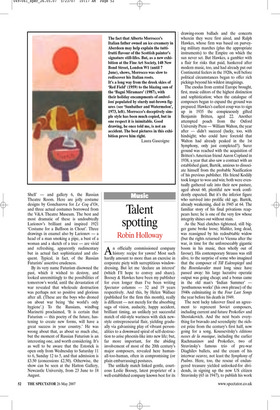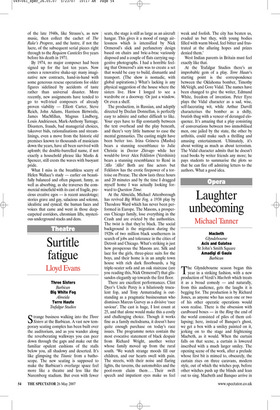Talent spotting
Robin Holloway
An officially commissioned company history: recipe for yawns! Most such hardly amount to more than an exercise in corporate piety with surreptitious windowdressing. But let me ‘declare an interest’ (which I’ll hope to convey and share). Boosey & Hawkes have been my publisher for even longer than I’ve been writing Spectator columns — 32 and 19 years respectively. And this, by Helen Wallace (published for the firm this month), really is different — not merely for the absorbing saga of vision, audacity, happy accident, brilliant timing, an unlikely yet successful match of old-style wariness with slick newstyle entrepreneurial flair, yielding gradually via galvanising play of vibrant personalities to a downward spiral of self-destruction to arise phoenix-like into new life; but, far more important, for the abiding involvement of most of the 20th century’s major composers, revealed here humanall-too-human, often in compromising (or plain embarrassing) postures.
The unlikely match linked gentle, courteous Leslie Boosey, latest proprieter of a well-established company known best for its drawing-room ballads and the concerts wherein they were first aired, and Ralph Hawkes, whose firm was based on purveying military marches (plus the appropriate instruments) to the Empire on which the sun never set. But Hawkes, a gambler with a flair for risks that paid, hankered after modern music, too, and had already put out Continental feelers in the 1920s, well before political circumstances began to offer rich pickings beyond his wildest imaginings.
The exodus from central Europe brought, first, music editors of the highest distinction and sophistication; when the catalogue of composers began to expand the ground was prepared. Hawkes’s earliest coup was to sign up in 1935 the conspicuously gifted Benjamin Britten, aged 22. Another attempted poach from the Oxford University Press — William Walton, the year after — didn’t succeed (lucky, too, with hindsight; who could have foretold that Walton had already peaked in the 1st Symphony, only just completed?). Surer ground was reached with the acquisition of Britten’s American friend Aaron Copland in 1938, a year that also saw a contract with an established giant, Bartók, anxious to dissociate himself from the probable Nazification of his previous publisher. His friend Kodály took longer to woo and win; both were eventually gathered safe into their new pasture, aged about 60, plentiful new work confidently expected. But it’s the inferior figure who survived into prolific old age. Bartók, already weakening, died in 1945 at 64. The familiar story of his final privations reappears here; he is one of the very few whose integrity shines out without stain.
As the Nazi clutches tightened, still bigger game broke loose; Mahler, long dead, was reassigned by his redoubtable widow (but the rights returned to Vienna after the war, in time for the unforeseeably gigantic boom in his music, then wholly out of favour). His contemporary Strauss was still alive, to the surprise of some who imagined that the composer of Till Eulenspiegel and the Rosenkavalier must long since have passed away: his large lucrative operatic output was going cheap; and a bonus came in the old man’s ‘Indian Summer’ — ‘posthumous works’ (his own phrase) of the 1940s culminating in the Four Last Songs the year before his death in 1949.
The next lucky takeover fixed an agreement to represent Soviet composers, including current and future Prokofiev and Shostakovich. And the next beats everything for bravado and serendipity: the richest prize from the century’s first half, now going for a song, Koussevitsky’s éditions russes de la musique, including the earlier Rachmaninov and Prokofiev, two of Stravinsky’s famous trio of pre-war Diaghilev ballets, and the cream of his interwar oeuvre, not least the Symphony of Psalms. Here, too, the rescue of endangered treasure yielded unlooked-for dividends, in signing up the now US citizen Stravinsky (65 in 1947), to publish his work of the late 1940s, like Strauss’s, as new music, then collect the cachet of The Rake’s Progress, and the lustre, if not the lucre, of the subsequent serial pieces right through to the Requiem Canticles five years before his death in 1971.
By 1974, no major composer had been signed up for the last ten years. Now comes a renovative shake-up: many imaginative new contracts, hand-in-hand with some generous rescue operations for older figures sidelined by accidents of taste rather than universal disaster. More recently, new assignments have tended to go to well-tried composers of already proven viability — Elliott Carter, Steve Reich, John Adams, Harrison Birtwistle, James MacMillan, Magnus Lindberg, Louis Andriessen, Mark-Anthony Turnage. Disasters, frauds, bad managerial choices, takeover bids, rationalisations and streamlinings, even a move from the historic old premises known to thousands of musicians down the years, have all been survived with aplomb; the double-barrelled name, if not exactly a household phrase like Marks & Spencer, still crests the waves with buoyant pride.
What I miss in the breathless scurry of Helen Wallace’s study — earlier on beautifully balanced and often piquant, funny, as well as absorbing, as she traverses the commercial minefield with its cast of fragile, precious creative egos — is recent anecdotage; stories grave and gay, salacious and solemn, idealistic and cynical; the human faces and voices that came and went in those deepcarpeted corridors, chromium lifts, mysterious underground stacks and dens.



















































































 Previous page
Previous page